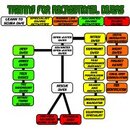Just my interpretation, but I divide PADI specialty courses into 3 categories:
1) Specialist Activities - Subjects that either focus on a specific equipment proficiency (i.e. sidemount, dpv) or a specific diving competence (nitrox, buoyancy, search & recovery).
2) Marine Life and Conservation Interest - Subjects that focus upon (as the name implies) the marine environment and issues that stem from it.
3) Advanced Diving Activities - Subjects that require a higher level of training, where specific risks and hazards present themselves. Typically, these courses are only available beyond AOW, not OW level). Would include; deep, wreck, cavern, tech basics, tec sidemount etc. In many instances, I present these courses at the 'Tecreational' level.
That is how I list and present them on my
website:

When you ask about 'benefit' - that is really something defined by the individual. There are many perceptions of benefit - typically defined by a persons interests and goals.
If you specifically mean the benefit of 'skill development', then -of course- not every PADI specialty course is ideal in contributing to that goal.
As for your ability to self-learn the topics covered in those classes, then yes - you can learn that by yourself. A 15 year old kid just hit the news because he invented a ground-breaking clinical test for cancer - all via Google research and self-learning.... so the limits of 'self-learning' via the internet are really proven effective.
Having said that, the learning outcome of any given course is ultimately dictated by the quality and knowledge of the instructor. Whilst the relevant PADI Manual might only present the 'bare bones' of a topic, a motivated and capable instructor should be able to provide a wider breadth of material from their own knowledgebase. There's a fair few qualified marine biologists out there working as scuba instructors - and they have a great deal of supplementary knowledge to contribute to such courses.
In addition, many of the 'conservation' themed PADI courses specifically focus on the application of the manual materials in a
local context - it is the job of the instructor to add relevance to the materials by teaching how specific issues impact on a local or regional basis.
Come to Subic Bay and your 'Project Aware' course goes into detail on the Seahorse study and artificial reef projects that we have ongoing. Likewise, the 'Coral Reef Conservation' course focuses on our local issues - the impact of dynamite and cyanide fishing practices. These include the opportunity to get involved with the projects themselves, the local community and assist, or observe, with the dives we do.
You can't judge the quality of a course from reading a course outline online - talk to prospective instructors and find out exactly what they have to offer.




